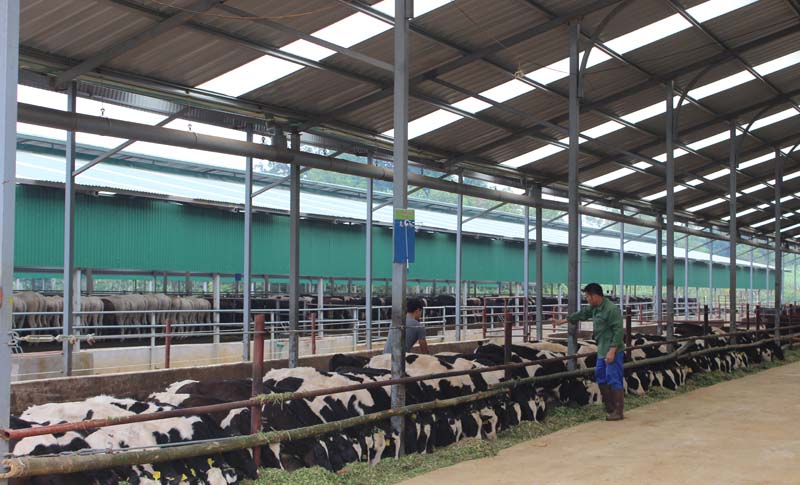
HBO – As of the end of 2017, Hoa Binh counted 55 investment projects in agriculture and rural areas with combined capital of more than 14.5 trillion VND, accounting for 11.2 percent of the total investment projects in the province. The surge in number of firms investing in agriculture and rural development after many years is a positive sign in the province’s economic situation.

An investment project building a
farm at the core of a regional linkage to raise breeding cows is carried out in
Tan My commune, Lac Son district
Hoa Binh has many favourable conditions for agricultural
production, particularly in the cultivation of fruit trees and the raising of
cattle and poultry. During 2008-2017, out of 2,587 firms and investors granted
business licences, 174 were involved in agriculture and rural development, or
6.7 percent of the total.
The increase in number of firms choosing to operate in agriculture
is attributable to the implementation of State policy, which won approval of
the business community. Since 2008, the provincial People’s Committee has
licensed 47 investment projects in agriculture and rural development, using a
total 27,000 ha of land and more than 5 trillion VND.
Projects in agriculture and rural development are mostly farms
raising cattle/poultry and fish, and planting forests, clean vegetable/fruits
and medicinal herb. Some examples are the pig raising farm using bio-technology
in Lac Thuy, the farm combining high-yield chicken raising and fruit tree and
medicinal herb planting in Yen Thuy, the farm and a regional linkage to raise
breeding cows in Lac Son, and the forest planting project during 2012-2020 by
the Hoa Binh Forestry One Member Ltd Co.
According to statistics, firms operating in agriculture and rural
areas have an average annual income of 1.6 billion VND, and their workers have
an average monthly salary of 4 million VND. They have created jobs for more
than 9,000 local workers, and contributed more than 45 billion VND a year to
the State budget./.
Dao Village’s honey – a product certified with a 3-star OCOP (One Commune One Product) rating by Thong Nhat Agricultural Cooperative in Dao Village (Hoa Binh City) – is highly regarded by consumers for its quality, richness, and variety in packaging. The distinctively sweet taste of Dao Village’s honey leaves a lasting impression on anyone who has tried it.
In alignment with Project No. 07-DA/TU, issued by the Hoa Binh provincial Party Committee on November 1, 2021, Lac Thuy district has actively promoted investment and supported the sustainable development of its industrial and handicraft sectors during the 2021–2025 period. Alongside this, the district has remained committed to preserving and revitalising traditional craft villages.
Located in the northern part of Lac Thuy district, with a temperate climate and fertile soil, Phu Thanh commune has great potential and advantages in growing tea. The long-standing experience, combined with strict adherence to organic farming practices in the tea gardens, ensures that the dried tea products from Phu Thanh and Lac Thuy as a whole are sold out immediately upon production, providing a stable and prosperous life for the local people.
Amid efforts to streamline the administrative apparatus, Hoa Binh province has intensified measures to address challenges in land clearance, resettlement support, and infrastructure investment, aiming to speed up the progress of key projects.
Hoa Binh province has posted an unprecedented economic growth rate of 12.76% in the first quarter of 2025, marking its highest quarterly performance to date and positioning it as the second fastest-growing locality in the country, trailing only Bac Giang province.
Under current regulations, products in the One Commune – One Product (OCOP) programme that are rated three stars or higher must undergo re-evaluation every three months. However, in reality, some of these products fail to consistently meet the required standards, raising concerns about the sustainability of their OCOP certification. This underscores the urgent need for producers to enhance product quality and gradually develop their OCOP products into strong, marketable brands.



